11 Best Herbal Tinctures For Flatulence
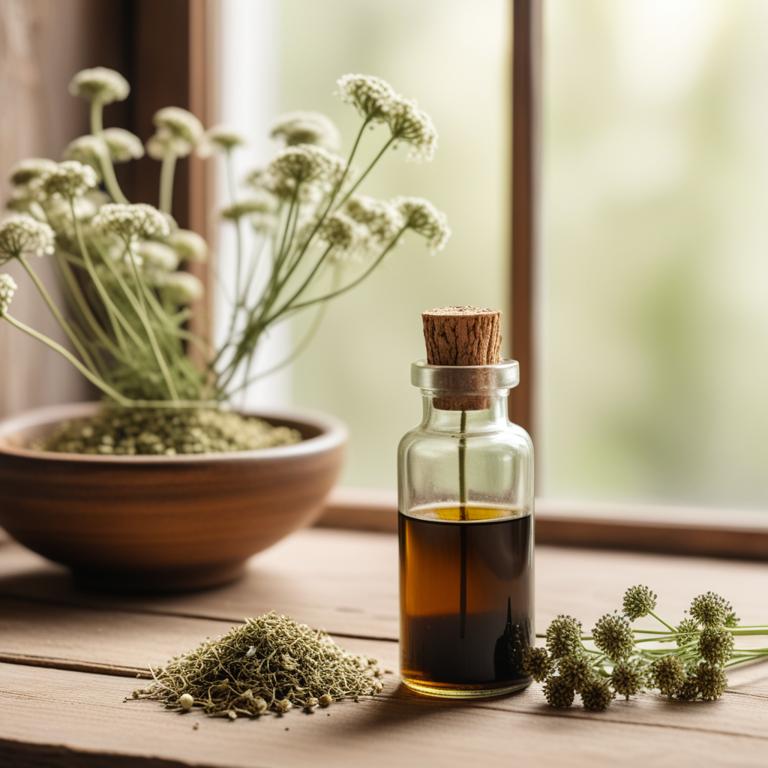
Herbal tinctures for flatulence are concentrated liquid extracts made from plants and herbs, used to treat digestive issues such as gas, bloating, and discomfort.
The benefits of using herbal tinctures to treat flatulence include their ability to soothe the digestive system, ease discomfort, and promote healthy digestion.
Examples of herbal tinctures used to treat flatulence include Peppermint tincture, which relaxes the muscles in the digestive tract, Ginger tincture, which aids digestion and reduces inflammation, Fennel tincture, which reduces gas and bloating, and Chamomile tincture, which calms the digestive system and promotes relaxation.
Additionally, other herbal tinctures such as Dill tincture, Caraway tincture, and Licorice root tincture are also used to treat flatulence due to their carminative and anti-inflammatory properties, which help to alleviate symptoms and promote overall digestive health.
According to "Journal of traditional and complementary medicine", tinctures for flatulence can be made from Mentha spicata, a cool and spicy plant with astringent and digestive properties, due to its main component carvone which has potency for treatment of flatulence related to indigestion.
Below there's a list of the 11 best herbal tinctures for flatulence.
- 1. Ferula assa-foetida tinctures
- 2. Angelica archangelica tinctures
- 3. Curcuma longa tinctures
- 4. Foeniculum vulgare tinctures
- 5. Trachyspermum ammi tinctures
- 6. Berberis vulgaris tinctures
- 7. Cuminum cyminum tinctures
- 8. Iberis amara tinctures
- 9. Myrrhis odorata tinctures
- 10. Pimpinella anisum tinctures
- 11. Pimpinella major tinctures
Also you may be interested in...
TODAY'S FREE BOUNDLE
Herb Drying Checklist + Herbal Tea Shopping List + Medicinal Herbs Flashcards
Enter you best email address below to receive this bundle (3 product valued $19.95) for FREE + exclusive access to The Aphotecary Letter.
$19.95 -> $0.00
1. Ferula assa-foetida tinctures

Ferula assa-foetida tinctures are a natural remedy used to treat flatulence, a common digestive issue characterized by excessive gas and bloating in the abdomen.
The properties of this herbal preparation, rich in bioactive compounds such as alkaloids, flavonoids, and terpenes, help to alleviate symptoms by reducing gas production and improving digestion.
The bioactive constituents of Ferula assa-foetida tinctures, particularly the resiniferatoxin, exhibit carminative and anti-inflammatory properties, which help to calm the digestive system and reduce inflammation in the gut, thereby providing relief from flatulence.
The benefits of using Ferula assa-foetida tinctures to treat flatulence include improved digestion, reduced bloating, and a decrease in discomfort and pain associated with excessive gas production.
2. Angelica archangelica tinctures
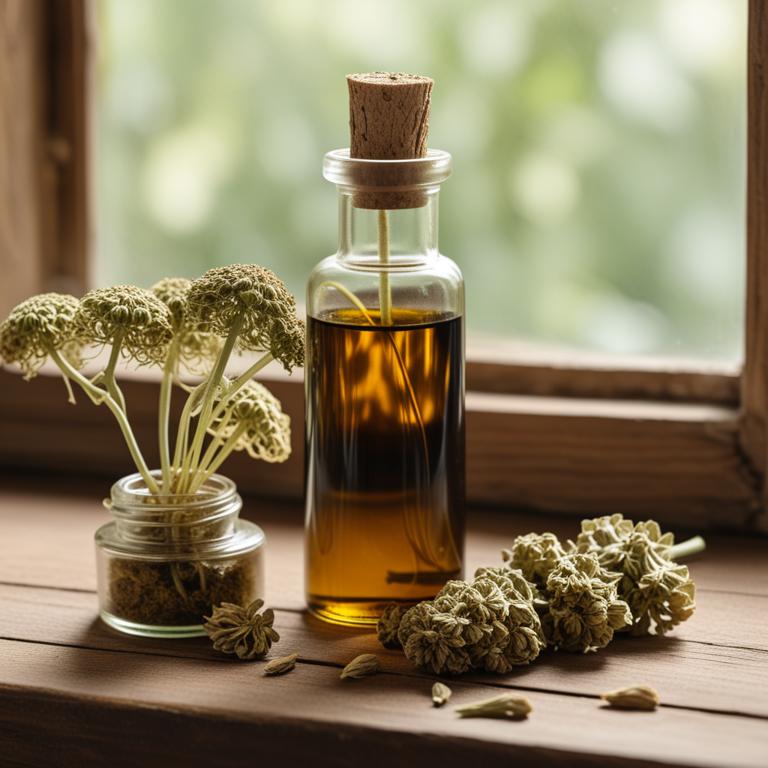
Angelica archangelica tinctures have been traditionally used to treat flatulence and other digestive issues due to their anti-inflammatory, carminative, and antispasmodic properties.
The bioactive constituents such as volatile oils, flavonoids, and phenolic acids in these tinctures help to relax the smooth muscles in the digestive tract, reducing gas and alleviating discomfort.
By regulating digestion and reducing inflammation, Angelica archangelica tinctures can provide relief from symptoms associated with flatulence, such as bloating, cramps, and abdominal pain.
Regular use of these tinctures can also promote overall digestive health and alleviate symptoms of irritable bowel syndrome (IBS), making them a popular natural remedy for digestive issues.
3. Curcuma longa tinctures

Curcuma longa tinctures have been traditionally used to treat flatulence due to their carminative and anti-inflammatory properties.
The bioactive constituents responsible for these effects include curcumin, which helps to alleviate digestive discomfort by reducing inflammation and gas production in the gut.
By soothing the digestive system and reducing spasms, Curcuma longa tinctures help to treat flatulence by promoting a sense of relief and comfort.
Regular use of this herbal preparation can provide benefits such as improved digestion, reduced bloating, and enhanced overall gut health.
Related Study
According to the study, Curcuma longa tinctures for flatulence may contain curcumin as a main active substance, which could potentially alleviate symptoms of flatulence, although further research is needed to comprehensively evaluate its benefits and safety.
4. Foeniculum vulgare tinctures
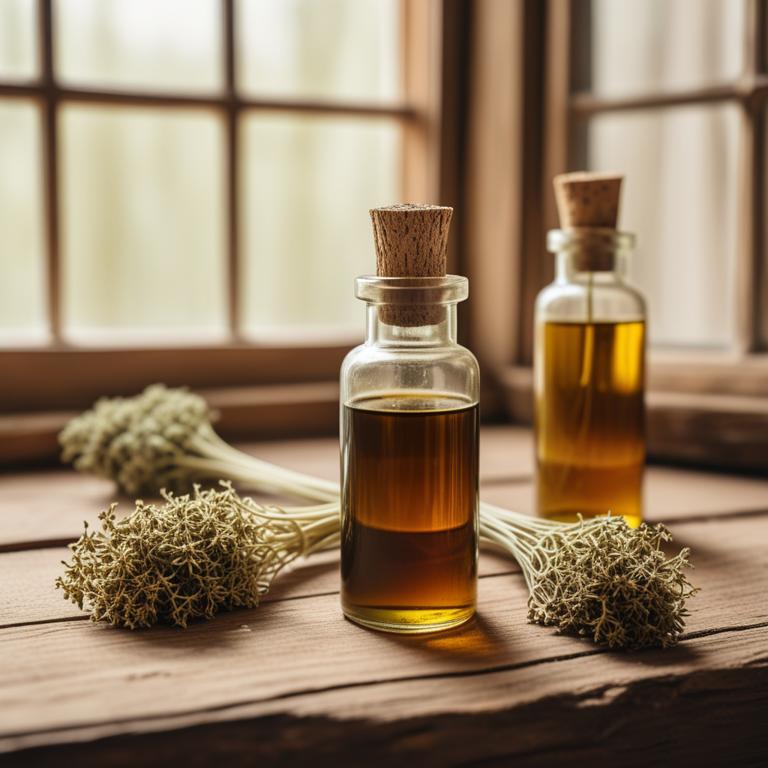
Foeniculum vulgare tinctures have been traditionally used to alleviate flatulence and associated digestive discomfort due to their carminative and anti-inflammatory properties, which help to reduce gas and alleviate bloating.
The bioactive constituents of Foeniculum vulgare, including essential oils such as anethole and estragole, have been found to relax the muscles in the digestive tract, thereby facilitating the passage of gas and reducing symptoms of flatulence.
The use of Foeniculum vulgare tinctures has been associated with various benefits, including improved digestion, reduced bloating, and alleviation of discomfort, making it a popular herbal remedy for flatulence.
By promoting the relaxation of the digestive tract muscles and reducing inflammation, Foeniculum vulgare tinctures can provide relief from flatulence and promote overall digestive health.
Related Study
According to "Journal of ethnopharmacology", Foeniculum vulgare tinctures for flatulence may be beneficial due to its active constituent, fennel essential oil (FEO), which has been shown to reduce the intensity and frequency of uterine contractions, potentially alleviating symptoms of dysmenorrhea and possibly flatulence.
5. Trachyspermum ammi tinctures
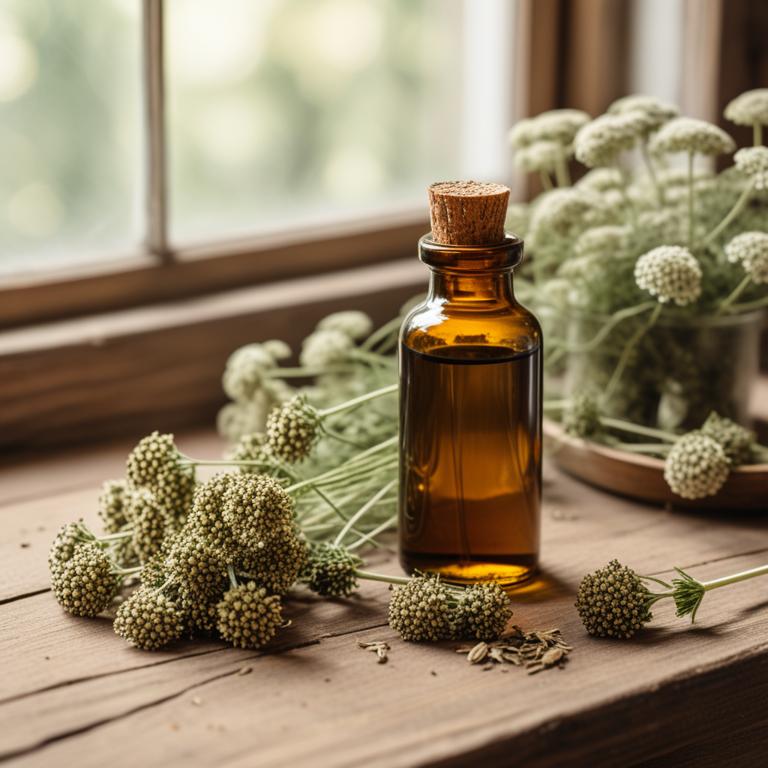
Trachyspermum ammi tinctures, derived from the seeds of the Ajwain plant, have been traditionally used to treat flatulence, a common gastrointestinal disorder characterized by excessive gas and bloating.
The antispasmodic properties of Trachyspermum ammi tinctures help to alleviate abdominal cramps and discomfort associated with flatulence, while its carminative properties aid in the expulsion of gas from the digestive system.
The bioactive constituents of Trachyspermum ammi tinctures, including thymol and carvone, possess anti-inflammatory and antimicrobial properties that contribute to its effectiveness in treating flatulence.
The benefits of using Trachyspermum ammi tinctures to treat flatulence include rapid relief from discomfort, improved digestion, and a reduction in the frequency and severity of gas-related symptoms.
Related Study
According to "Explore (New York, N.Y.)", Trachyspermum ammi tinctures for flatulence showed a significant decrease in symptoms of bloating compared to the placebo group in patients with Irritable Bowel Syndrome (IBS).
6. Berberis vulgaris tinctures
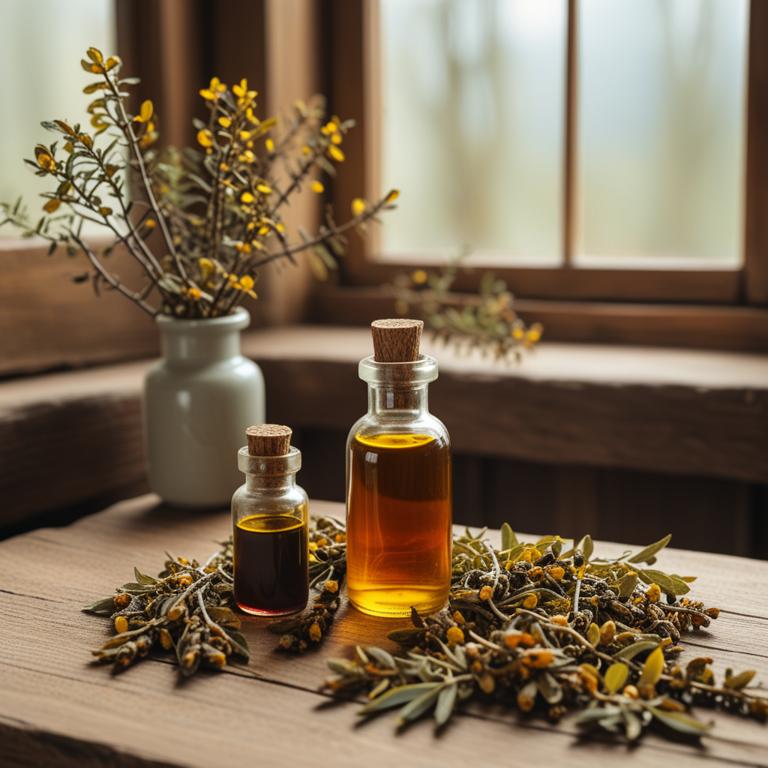
Berberis vulgaris tinctures, a traditional herbal remedy, have been used to treat flatulence due to their carminative and spasmolytic properties.
The herbal preparation helps to alleviate this ailment by reducing gas formation in the digestive system and relaxing the muscles in the abdominal region, thereby providing relief from discomfort and pain.
The bioactive constituents of Berberis vulgaris, including berberine, berbamine, and oxyberberine, possess anti-inflammatory and antispasmodic properties that contribute to its effectiveness in treating flatulence.
The benefits of using Berberis vulgaris tinctures to treat flatulence include natural relief from symptoms, reduced risk of complications, and the potential to promote overall gut health and well-being.
7. Cuminum cyminum tinctures
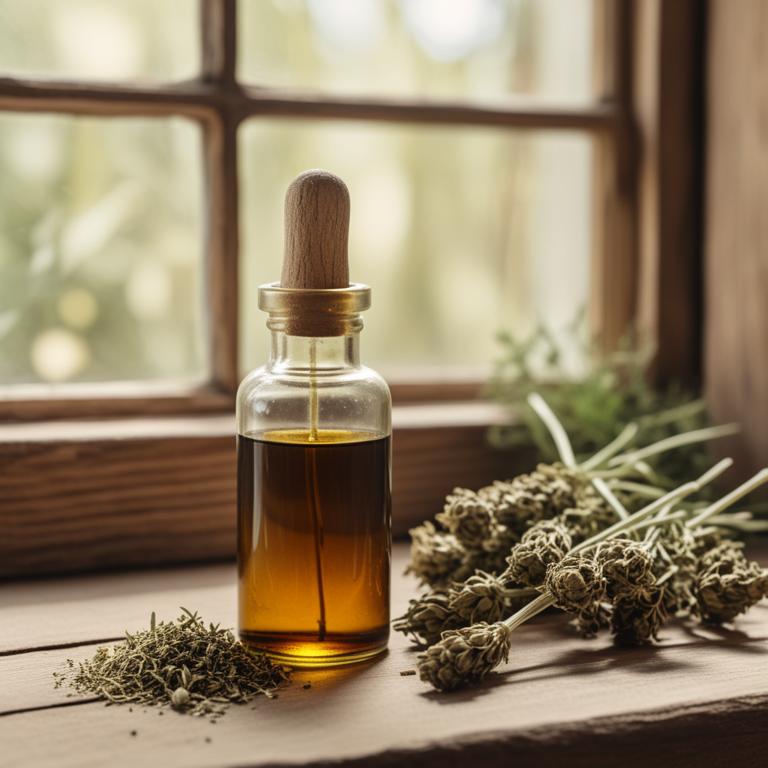
Cuminum cyminum tinctures have been traditionally used to treat flatulence due to their carminative properties, which help to release trapped gas and alleviate digestive discomfort.
The bioactive constituents, including cuminaldehyde and cuminic acid, possess anti-inflammatory and antioxidant properties that soothe the digestive tract and reduce symptoms of flatulence.
By stimulating digestion and improving gut motility, Cuminum cyminum tinctures help to prevent the buildup of gas and alleviate symptoms such as bloating, abdominal pain, and discomfort.
Regular use of Cuminum cyminum tinctures may also help to reduce the frequency and severity of flatulence episodes, providing long-term relief and improving overall digestive health.
8. Iberis amara tinctures

Iberis amara tinctures, derived from the flowering plant Iberis amara, are herbal preparations used to treat flatulence and related digestive issues.
The properties of Iberis amara tinctures that help to treat this ailment include its carminative and anti-inflammatory properties, which work together to reduce gas and alleviate discomfort.
The bioactive constituents responsible for these effects are sesquiterpene lactones and alkaloids, which have been shown to relax smooth muscle, reduce inflammation, and improve digestion.
The benefits of Iberis amara tinctures in treating flatulence include providing quick relief from symptoms, preventing future episodes, and promoting overall gut health and well-being.
9. Myrrhis odorata tinctures
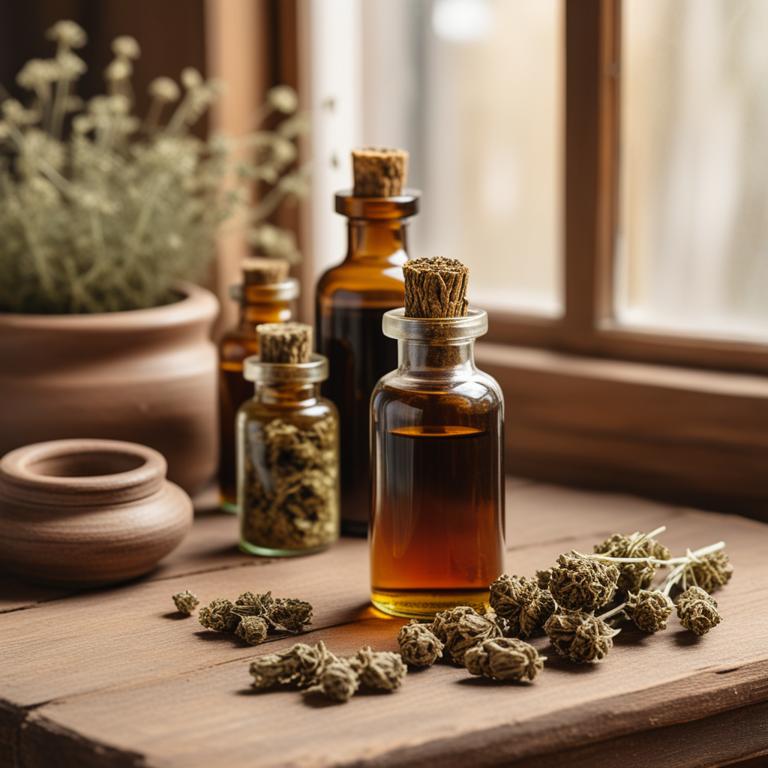
Myrrhis odorata tinctures have been traditionally used to treat flatulence, a condition characterized by excessive gas and bloating in the digestive system.
The anti-inflammatory and carminative properties of this herbal preparation help to soothe the digestive tract, reducing inflammation and relieving discomfort caused by gas and bloating.
The bioactive constituents, such as volatile oils and phenolic compounds, contribute to its therapeutic effects by relaxing the muscles in the digestive tract and reducing the production of gas.
By using Myrrhis odorata tinctures, individuals can benefit from its natural ability to alleviate flatulence, promoting a sense of comfort and well-being.
10. Pimpinella anisum tinctures
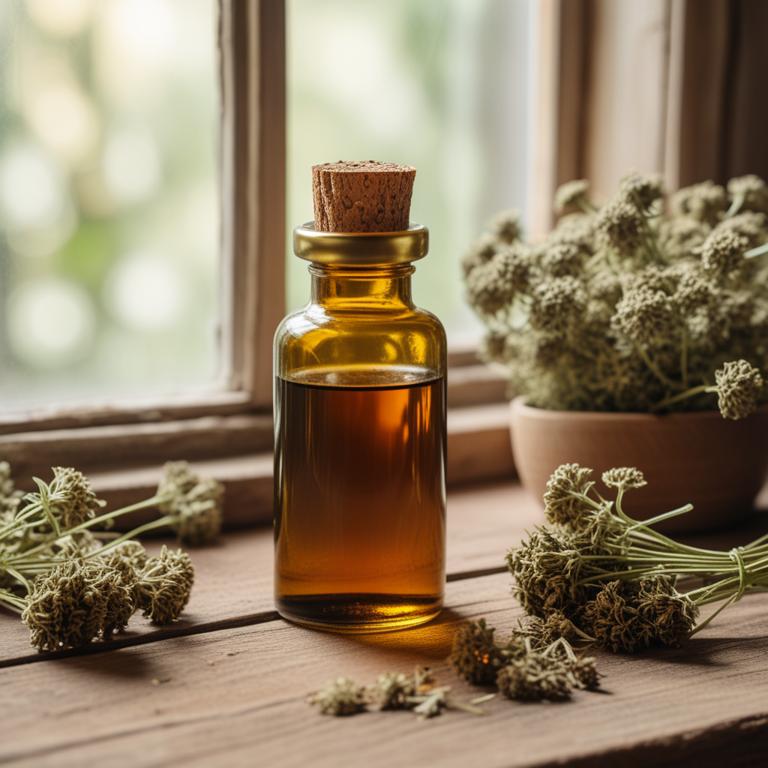
Pimpinella anisum tinctures have been used traditionally to treat flatulence, a condition characterized by excessive gas and bloating in the digestive system.
The properties of Pimpinella anisum tinctures that aid in treating flatulence include its carminative and anti-inflammatory properties, which help to soothe the digestive tract and reduce gas and discomfort.
The bioactive constituents of Pimpinella anisum tinctures, such as anethol and limonene, have been found to have a relaxing effect on the digestive system, reducing spasms and inflammation, and thereby alleviating flatulence symptoms.
The benefits of using Pimpinella anisum tinctures to treat flatulence include its natural and non-invasive approach, making it a safer alternative to pharmaceutical medications and promoting overall digestive health.
11. Pimpinella major tinctures

Pimpinella major tinctures, derived from the seeds of the Pimpinella major plant, possess carminative and anti-inflammatory properties that help to treat flatulence.
This herbal preparation works by reducing gas formation in the digestive system and alleviating symptoms such as bloating, discomfort, and abdominal pain associated with flatulence.
The bioactive constituents of Pimpinella major tinctures, including essential oils and flavonoids, help to relax the muscles in the digestive tract, thereby facilitating the passage of gas and reducing its accumulation.
By using Pimpinella major tinctures, individuals can experience relief from flatulence and enjoy a range of benefits, including improved digestion, reduced symptoms, and enhanced overall well-being.